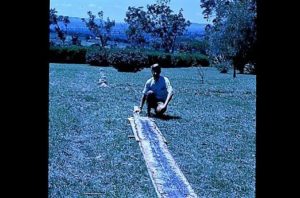
“Somebody from his home village sent it to him. Someone with a grudge. The envelope with that stuff inside came hand-delivered yesterday and he’s been like this since.”
I thought of the things that led up to this moment. ‘Curse updates’ don’t often happen in Oklahoma. But this thing seems really serious.
My friend, Jerry, had summoned the unusual parcel. We noticed the opened envelope bulged a bit. In it was a strange assortment – random, spooky things not fit for having around.
“Elements of a curse. It’s what this is. Whoever sent it to Omondi wasn’t playing games. They planned real physical and mental harm for him. Even death. Take a look at these bone fragments, the ashes mixed in, these bits of rock.”
We eyed the elements warily. Something became clear in those moments. The recipient of this “gift”, the young vocational student, knew he had been cursed. His fear was real. Omondi knew he could die at the hand of a power behind these items. Invisible but real, a terribly dark force – too strong to withstand.
Jerry and I stood silently, each in our own thoughts. Both of us anxious. Each of us sensed the other was praying, groping for guidance. How do you contend with this kind of thing? In another setting one could shrug it off as a game of foolish superstition. But we sensed this to be a full-on display of an evil presence, dispatched somehow to render harm. What could we do?
A thought had begun stirring in me. Pushing past a temptation to just ignore it, I turned to my friend.
“Jerry, would you mind if we try something?” He waited for me to go on. “Can someone bring matches? I think we need to urge this young man to resist, that he fight this thing in the power of Christ.”
Only partly-sure of my instinct, I continued. My confidence grew.
“I believe he needs to break this curse and we can be there, through it with him. We can pray. But I do think he needs to set these things on fire and destroy them. It will be his statement of God’s claim on his life. If he’s willing to, that is.” Jerry nodded.
As I had been speaking the words I knew I was out of my depth. I felt I may be trembling on the inside as much as Omondi was on the outside.
Matches were brought. We moved to an enclosure and sat on the floor, Jerry and I at either side of him.
After sharing Scripture with Omondi, affirming the goodness and the truth of Jesus and the power of his name, we asked him if he agreed with Jesus’ words. “Do you believe that God has power above all?”. He nodded slightly and we pressed ahead, inviting him to offer himself fully to Jesus Christ. Slowly, deliberately he voiced a prayer of surrender to God. My friend, Jerry and I, never let up calling on the Lord from our hearts. After a moment I looked into the young man’s eyes.
“Good. OK, now Omondi, do you renounce all witchcraft, any kind of it? Do you reject all spirit forces that oppose the Lord Jesus? Can you say that you do?” In a weak response he whispered yes. When asked one more time, he came back with an assertive “Yes”.
“OK”. I raised the envelope with its contents before him. Some apprehension seemed to play at his eyes. But his fear had lessened and my friend and I sensed Omondi was choosing freedom. We kept praying, “Help him, Lord Jesus. Be near.”
“Alright now, let’s light the match.”
At first his hand trembled with such intensity that I took his hand in mine and we gripped the match together. Thankful for his clear resolve to continue, we struck the match and lit the envelope and contents, Jerry and I voicing thanksgivings to Jesus the whole time. And a beautiful thing followed.
Witnessing the flame take over the elements, we felt a release of joy. The three of us came to our feet. Jerry and I called out in joy and conviction, praising the name of our Lord. Fear had left. Had left us all. Omondi’s head pain went away. Deliverance had come.
Afterwards, as we prepared to leave, the name of a pastor I knew from Omondi’s home area came to my mind. I sent a message to him. The two connected in coming days.
At the end of the day we were at peace. Wow.
The power of Christ had prevailed over raw evil. And two young – less-than-fearless – missionaries had been invited to take part. No wonder it’s called Good News.
We had witnessed the display on this day the authority of Christ’s name. A power greater than witchcraft, greater than fear and even death. The power of love.
It was a day of thanksgiving.
©2017 Jerry Lout



